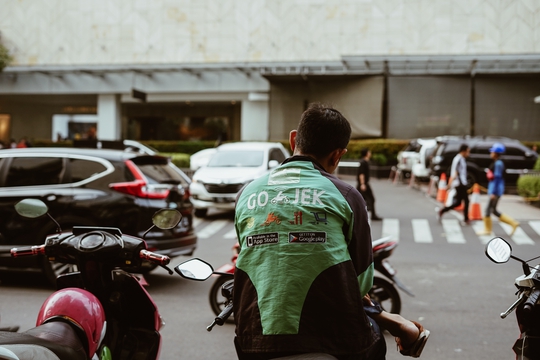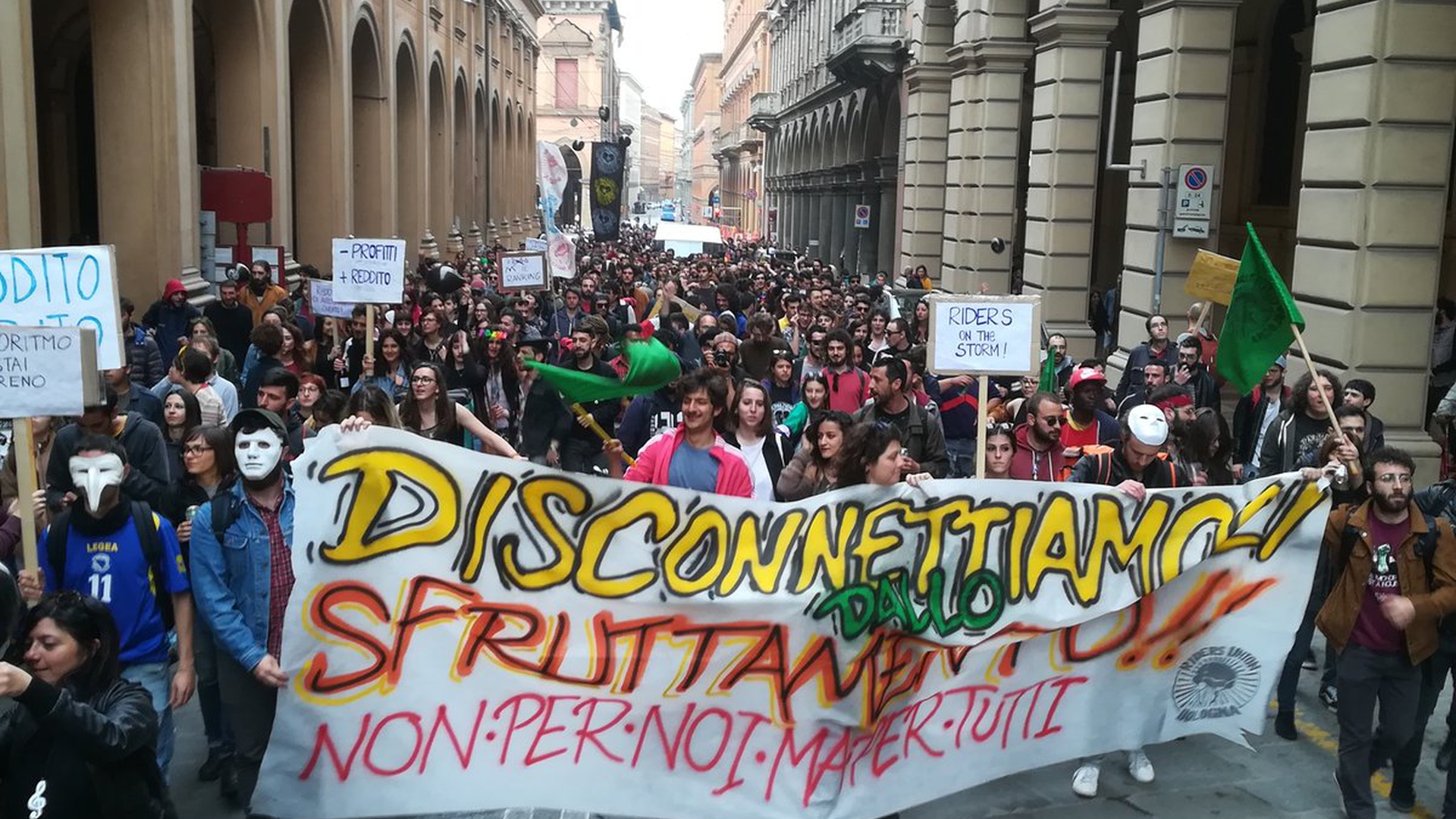No Union Is a Problem
by
Arif Novianto (@arifnovianto_id)
August 24, 2021
Wildcat Strike Season of Gig Workers in Indonesia

inquiry
No Union Is a Problem
by
Arif Novianto
/
Aug. 24, 2021
Wildcat Strike Season of Gig Workers in Indonesia
The wildcat strike season is currently underway in Indonesia. In June 2021, there were four strikes by Indonesian gig workers. All were carried out by workers logging off their accounts on the platform applications. The first strike was by GoKilat couriers (a one-day delivery service from GoTo, formed from a merger between Gojek with Tokopedia) for three days, from the 8-10th June. The second strike took place the day after, carried out by Lalamove couriers, from the 11-13th June. The third strike was led by workers at Grab on the 23-25th June. Then fourth, strikes on the 29th and 30th June were again carried out by GoKilat couriers because their demands from the first strike were not met by the platform company or the Indonesian government.
There are four similarities in these different strikes of gig workers in Indonesia: the movement is spontaneous, they are not connected to the larger unions, the strike is not legal in terms of Indonesian regulations — even Gojek’s own regulations considered any form of action that can be detrimental to the platform company, such as a strike, as included in category V violation and drivers can be sanctioned with termination of partnership or dismissal — and there is no main leader in the movement. Thus, the actions by the gig workers can be described as a ‘wildcat strike’. This is a strike which in the eyes of formal law is considered not legal, by platform companies such as Gojek as a violation of company rules, and which the larger and more established gig worker union in Indonesia, namely Garda (Gabungan Aksi Roda Dua / Two-Wheel Action Association), ignores and even claimed that the strike was just a hoax.
Wildcat Strikes in Platform Capitalism
Companies in the gig economy have actively discouraged workers from unionizing and carrying out collective resistance against platform companies or employers. Some academics have argued that gig workers lack the imagination for collective solidarity, because their work is separated into individualised tasks, making it difficult for them to join general class-based movements. Moreover, in the gig economy the labor process is controlled by algorithms, which forces gig workers to compete with one another and is considered to be a further cause of their depoliticization.
In contrast to such arguments, I argue that the new forms of control in the gig economy have engendered a different form of resistance. From January to June 2021 in Indonesia there have been seven protests carried out by gig workers, five of which were carried out through the strike method. This reality has certainly undermined the pessimism about the potential resistance of gig workers under platform capitalism.
Platforms rely on digital technology to control workers. This form of control has proven effective in maximizing gig workers’ working time. This control ensures that the labor power of gig workers will be used from the very second when an order comes in, then is discarded immediately after the order is completed, and so on. The supervisory role is no longer carried out by supervisors or foremen but through two mechanisms: the digital system and consumer ratings.
These new forms of control in platform capitalism have created at least two contradictions. First, strict control has dehumanized gig workers, encouraging them to recognize the injustices they experience and bringing them closer to collective consciousness. The algorithm operates as if it were managing a robot rather than a worker, imposing strict delivery time limits, forcing gig workers to wait for orders in crowded and often uncomfortable locations, automatically sanctions workers when they miss or reject orders, and unilaterally suspends workers when they receive bad ratings from consumers. One form of resistance by gig workers against this algorithm control is to use mod applications or fake GPSs to make their work easier, reducing the pressure of their workload.
Second, the requirement to use digital tools makes social media a new field for organizing gig workers. Workers can use smartphones to exchange ideas and complain about their work. The concerns of heavy workload and injustices that they suffer at the hands of the platforms are poured onto social media. This fosters their imagination of a shared common experience. The growing unrest has sparked awareness about the need for change.
These contradictions, produced by the new forms of control through the algorithm, have triggered conflicts on a daily basis. They are responses to unilateral sanctions; refusing orders because they consider the tariffs to be inappropriate or the goods to be delivered exceed the standard operating procedure provisions; responding to bad ratings from consumers even though they feel they did nothing wrong; the app showing the wrong map location; complaining about parking fees and other sanctions applied to drivers. Although the sanctions are directed at individual gig workers, the sharing of information about the injustices being experienced has pushed them to the realization that many of them do indeed possess the same experience. Therefore, it is just a matter of time before these small, daily conflicts turn into bigger struggles, such as wildcat strikes or daily protests.
The Rise of the Wildcat Strike
At the start of the booming ride-hailing platform economy in Indonesia there were not many wildcat strikes. The high workload and injustices experienced by gig workers were acceptable at first due to the high incomes. The years between 2015 to 2019 were the honeymoon period in which gig workers enjoyed great incentives, despite the low basic tariff. However, the research that I and others at the Institute of Governance and Public Affairs (IGPA) at the Universitas Gadjah Mada conducted has shown a downward trend in the income of gig workers from 2019 to 2020. This started at Rp. 360,489 (~£18.10) per day in December 2019, falling down to Rp. 266,225 (~£13.40) per day in February 2020. Incomes drastically decreased during the COVID-19 pandemic to Rp. 89,267 (~£4.50) per day in April 2020. The downward trend of income in 2020 was not only caused by the COVID-19 pandemic however, but also due to the end of the honeymoon period, when extra incentives were gradually cut, while the basic tariff remained low, at only Rp. 1.600–2.250 (~£0.08-0.11) per km.
The resistance from gig workers at GoKilat against the Gojek platform company arose because of a unilateral cut in incentives. The cuts have seen their net income drop by nearly 30%. As a form of protest, they went on strike for 3 days, then 18 days later they went on strike again for another 2 days.
The first strike was launched in a Facebook group and a WhatsApp group of GoKilat drivers. In the Facebook group, the call to strike garnered 430 comments, most of them approving of the strike initiative. Several gig workers also proposed various other strategies and tactics of resistance. These included mass protests in front of Gojek’s office and mass mobilisation with motorcycle parade in order to cause traffic jams and get the public’s attention. These suggestions were aimed at winning their main demand to cancel the platform company policy of reducing incentives.
In a Facebook group containing thousands of members, most of whom are GoKilat drivers, they discussed and debated the appropriate strategy to follow. The social media space functions similarly to a large meeting room filled with traditional workers when they plan strikes. In the Facebook group, most of the workers do not know or have never even met one other. Even so, there is a shared experience between them as well as a common demand for rejecting the policy of unilaterally reducing incentives by the Gojek company.
The reduction also raised awareness of the unfair relationship between gig workers and the platform. Two days before the strike started, through joint discussions the workers issued a press release stating that there was a misclassification regarding their work status. If they are called “partners” by Gojek, then whenever there is a policy change it should be necessary to negotiate with gig workers as partners of the platform company. However, what happens is that they are called “partners” to avoid giving them worker rights, while their rights as partners are not fulfilled by the platform company.
Similarly, the strike by gig workers at Lalamove was also prompted by the unfair working relationship they experienced. The main problem was related to their daily income which is not paid by Lalamove’s management on the sameday. This situation was a source of tensions until finally there was a suggestion from a driver in the Lalamove drivers Facebook group to go on strike in protest.
However, unlike the gig workers at GoKilat, who mostly agreed to the strike proposal, at Lalamove there was more disagreement about the strategy. Despite the debate, the strike was still carried out, although there was not as much support. At GoKilat, around 1,500 couriers went on strike, which represents about 80% of the active gig workers at GoKilat in Jabodetabek (Jakarta, Bogor, Depok, Tangerang, and Bekasi city).
A similar pattern occurred when gig workers on the Grab platform went on strike for 3 days. They protested low tariffs, which affected their low daily income. The strike proposal emerged in the WhatsApp group of a specialist gig worker association called GrabExpressSameday. From there, it spread in various Facebook groups and other WhatsApp communities. In the end, there were ten communities of gig workers on the Grab platform, involving at least 750 drivers, who agreed to go on strike.
The four strikes by gig workers in Indonesia in June 2021 did not involve mass action or taking to the streets in large numbers, because the situation of the pandemic prevented it. Instead, gig workers went on strike by logging off from their accounts and carrying out several activities: some were active at home, others chose to gather at their community basecamp or on the roadside, some were tasked with putting up banners and distributing brochures regarding their demands to the public, while others picketed to make sure that more couriers also went on strike. The picketing strategy was carried out by gig workers at GoKilat, because the number of gig workers involved in strikes was large (up to 80% of the total active couriers), making it possible for them to assert their strike.
The idea of picketing arose after a debate about strategy between GoKilat couriers in the Facebook group. One of the GoKilat couriers posted that the act of logging off from their account without taking to the streets would result in their demands being ignored. Many other GoKilat couriers rejected the idea of taking to the streets, because it could make them look bad in the eyes of the public in the midst of increasing COVID-19 cases in Indonesia. It could also be used by the security forces to repress the drivers through the pretext that they were increasing COVID-19 transmissions. Then an idea came from another GoKilat courier, that instead of taking to the streets, picketing is needed to ensure that most couriers are involved in strikes. The idea was that couriers could form pickets at stores that are subscribed to the GoKilat service. They picketed these shops to ensure that no one of the GoKilat couriers would deliver goods during the strike. The picketing strategy got a lot of approval, then the GoKilat couriers recorded which stores needed to be targeted and appointed which couriers would picket each store.
Leadership Distribution
In each of the four wildcat strikes discussed in this article, there was also a distribution of strike leadership roles. Every driver could speak equally on social media forums. However, some gig workers were more respected because of their leadership in previous actions or in the organisation of the current initiative. Agreement on strategy was reached through voting in each debate. This distribution of leadership allows each individual to take the initiative to propose specific forms of action to the forum. There is no bureaucracy that limits their plans.
However, currently the movement faces important challenges in the sustainability of the protests and how to win their demands. As has often been raised, the absence of formal unions in the movement has led to confusion about long-term goals and the necessary organising methods in order to strengthen the movement and lead it to victory.
Of course, the gig workers who are fighting back are aware of these weaknesses. They eventually formed a gig workers’ union. The gig workers at GoKilat formed the Online Courier Work Union on 10th of June 2021. It is a vehicle for obtaining justice and decent working conditions. The gig workers at Lalamove did the same. They are currently discussing self-organization and the formation of the Lalamove Partners Gathering Forum. Meanwhile, the gig workers at Grab that went on strike formed the GrabExpress Sameday Sejabodetabek Association.
In this sense, the wildcat strikes by gig workers in Indonesia differ from the wildcat strikes by traditional manufacturing workers, as shown by Joe Buckley’s research in Vietnam. According to him, manufacturing workers in Vietnam actually see the formation of independent trade unions as a step taking by the ruling class to tame the working-class movement and stop the wildcat strikes that hinder the maintenance of “harmonious industrial relations”. The wildcat strike strategy was able to work quite effectively in Vietnam, demonstrated by the evidence that about 80%-95% of their demands were met through this strategy. Meanwhile in Indonesia, none of the four wildcat strikes in June 2021 were able to force the platform companies to meet the workers’ demands. As a result, the five gig workers that I interviewed between the 10-24th June 2021 considered that the wildcat strike strategy was not enough and realised the need for a stronger political vehicle to carry the movement over the longer-term, namely unions.
We can summarise the initial process of Indonesian gig workers’ resistance to platform capitalism as: “No Leader, No Problem.” But based on their experiences, it has also become clear that: “No Union is a Problem.” Realising this, many gig workers in Indonesia spontaneously opted to form collective organizations in the form of unions as a political tool and a long-term solution to win their demands. At present, unions formed by the self-organisation of gig workers on different platforms are currently looking for ways to improve their organisational capacity. The gig unions from GoKilat, Lalamove, and GrabExpress Sameday, for example, are exploring whether to carry out a cross-platform strike, to increase pressure on platforms and insure that their demands are met.
author
Arif Novianto (@arifnovianto_id)
Subscribe to Notes from Below
Subscribe now to Notes from Below, and get our print issues sent to your front door three times a year. For every subscriber, we’re also able to print a load of free copies to hand out in workplaces, neighbourhoods, prisons and picket lines. Can you subscribe now and support us in spreading Marxist ideas in the workplace?
Read next

No Union, No Problem: Anatomy of a Vietnamese Wildcat
by
Joe Buckley
/
Aug. 16, 2018

